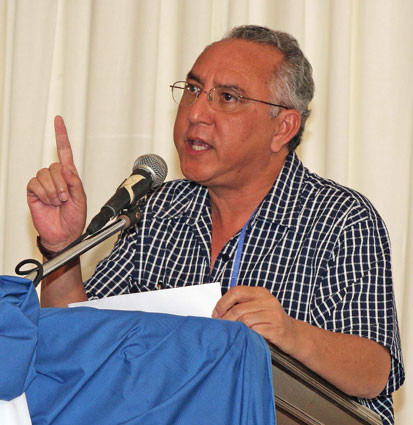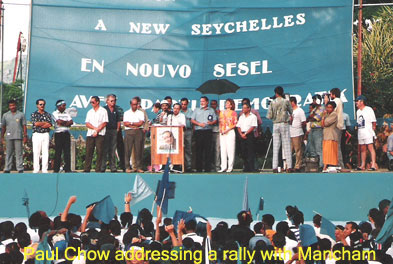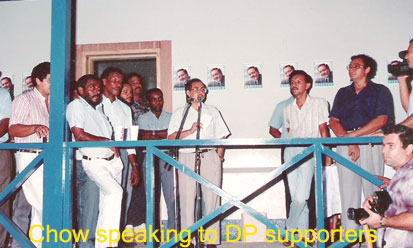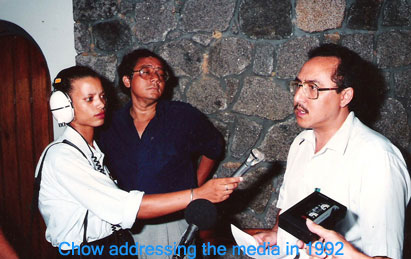

INTERVIEW WITH PAUL CHOW
“Nothing we have done has compromised our core beliefs”

LNSW: What exactly is your role or your affiliation with this newspaper?
PC: I cannot deny that I have an important role in its production, circulation and financing of the newspaper. I cannot also deny that I have a substantial influence in its editorial content. But my ambition for this newspaper is not that it becomes a mouthpiece of the Democratic but rather that it becomes a reliable medium to spread the message of the party here in
LNSW: You are currently the president of the Democratic Party. Does DP have a political role to play given the recent events that have occurred i.e. the shutting down of Regar and the boycotting of the National Assembly?
PC: The DP cannot be a simple bystander as far as the principles underlying the issues are concerned. It is clear that the ruling party is using and has been using and abusing the instruments of state power and privileges of office to undermine the other parties, in collusion with members of the judiciary as well as civil servants. The judgment against Regar is the latest example of this abuse. I have been a victim of that abuse too.
There is the story of the two explorers who found themselves in a dark cave looking for a known treasure but both had only candles to light their paths. One, who showed an inclination of selfishness, thought that if he extinguished the other’s candle he’ll have a decisive advantage. What he discovered, however, was that the cave became darker and the quest for the treasure became more difficult. The moral of this story is that by trying to close down Regar, the ruling party is only doing itself and the society a disfavour. They have yet to learn from the lesson of the coup d’etat when our party was effectively silenced. Without the Democratic Party our society disintegrated into violence, corruption and political decline.
In respect of the boycotting of the National Assembly, in this matter we are purely a bystander. I will not venture to judge the merit or otherwise of a decision taken by another political party that affects its own conduct. Only its members or the electorate can render such a judgement. However, we do share the concerns of the SNP regarding the lack of a level playing field and would join in all efforts designed to redress that imbalance.
LNSW: What is your opinion on the actions taken by the SNP and Regar?
PC: I do appreciate the frustrations of the leadership of SNP. I believe, however, not publishing sends a wrong signal because it gives the impression that we are in despair. I believe sincerely that history is on our side. The future of
LNSW: DP formed a coalition government with SPUP in 1976, then Albert Rene orchestrated an internal coup against a government in which he was prime minister. Bearing that in mind why did you sign up for an electoral alliance with the SNP?
PC: It was my judgement that the best position for the DP, in the light of the strong polarisation in the body politic, if it wanted to preserve its integrity as a party of the future, was to join forces with SNP. Given the nature of the playing field, where the medium of information was totally in the control of the SPPF, there was no opportunity at all for a third voice to be heard. Of course, the world we inhabit in 2006 is far different from that of 1976. Then two clear-cut ideologies determined the future of any country and the survival of its political actors, literally as well as figuratively speaking. Today, there is no longer any ideological divide. In today’s world the ability to manoeuvre on the digital information highway provides many opportunities.
LNSW: You have had close political ties with Mancham, you were also closely associated with Gerard Hoareau, the leader of the MPR and now you’ve had an electoral pact with the SNP. Does DP therefore have a political identity/ideology of its own?
PC: Mancham and I go a long way. So my ties are not just political but also personal. He gave me some of the best opportunities in life. For example he made me part of his delegation that went to Dar Es Salaam to confront the OAU about independence in 1973 after I had barely left school. I was fortunate to have been his personal assistant, paid by the party, when he was Chief Minister which involved helping to draft his historical address to the nation on the radio after he changed the DP’s policy of integration to full independence. He also gave me a unique opportunity to manage and to develop a business enterprise, which eventually became a successful books and stationery store that has yet to be equalled by anyone in
Gerard Hoarau and I go back to our school days at
The DP’s political identity is contained in its statement of principles which forms the core of its ideology. The most important is the first principle which states that “We believe in God Almighty and shall seek to maintain the Christian heritage and values of the Seychelles people in harmony with a Seychelles of all religions.” In conjunction with that are the other core beliefs such as “that the objects and authority of the government in society must be limited… and that individuals and families are better able to make economic decisions in their own interest than any government, however democratically elected it may be.” The DP will attract the best and the brightest of this country to its cause on the basis of its values not on promises of personal aggrandisement at the expense of the people.

LNSW: Would it be a fair comment to say that the DP are political opportunists, willing to ally themselves to any opposition party that will boost it to power?
PC: Nothing we have done has compromised our core beliefs. Bear in mind that one of our principles states “We believe that in the pursuit of political objectives there is no interest superior to the national interest.” It is in pursuance and furtherance of this principle that we joined with SNP. So no one can call our action opportunism. For that to be the case, we would have to compromise our principles and beliefs. Under my leadership it will never happen.
LNSW: You were very close to Gerard Hoareau, is there anything you learnt from him that you could share with our readers? What drove Gerard Hoareau to be such a forceful opponent of Albert Rene and his policies?
PC: Yes, I was very close to Gerard Hoareau. When his resident permit in South Africa was rescinded in the mercenary deal, he came to live with us for awhile where we planned an executed the MPR audio cassette campaign. Gerard was a perfectionist and hard headed. I think he had a character that was needed to lead a resistance movement. You must remember Gerard trained initially to be a priest and I think he saw in Rene the devil incarnate.

LNSW: Will DP be fielding its own candidates in the next elections or will it be putting forward candidates jointly with SNP?
PC: At this time this is our aim to field candidates. However, we hope that we can come to an arrangement to forge a united opposition front and present the electorate a straight and unambiguous choice.
LNSW: Will you be standing as a candidate in the next National Assembly elections?
PC: No I don’t intend to as I would like to have the freedom to rebuild the party to be ready to provide a strong candidate in 2011 to challenge for the presidency.
LNSW: When Mancham returned in 1992, there were high expectations from his supporters and today the reason that people are so disillusioned with DP is because they believe that he betrayed those expectations by ‘consorting with the enemy’ although Mancham at the time was preaching “national reconciliation”. Is this an accurate analysis of the reasons why DP lost so much of its support and what would it take to regain it?
PC: One of the dangers of this type of analysis is when it is self-serving. 1992 was a unique moment in our history. For 50% of the population it was like liberation after 15 years of dictatorship and Mancham’s presence among them was kind of security. It was the first time that people could speak freely without fear of official retribution.
In our euphoria we did not pay attention to Mancham’s underlying message. Mancham warned that we were in danger of entering a Kazye (a political version of the fish trap) unless we worked to level the political playing field. Mancham wanted all opposition forces to join together under a common front to achieve a level playing field. But the public wanted instant transformation of the society. Unfortunately, his caution was drowned in the euphoria of new found freedom to do things without restrictions and fear.
I don’t think history, when it is written, would lay all the blame for the demise of the party entirely at the feet of Mancham. After the 1993 elections our party was wracked with internal strife. Many will remember Christopher Gill’s “crossing the floor” antics in the National Assembly. My position too as Secretary General was challenged by those around us who wanted a “better seat” on the band wagon and, therefore, became blind as to where the bandwagon was headed. History will record, though, that the DP was able to reconstitute itself after 15 years of absence and fought 3 major campaigns with minimal financial and human resources while its core support base had gone into exile. All the same we came out with a respectable 33% of the votes. Unfortunately, we failed to recognise at the time, that our position was tenuous and that we were enjoying the band wagon effect. Once people got used to the ride it became dull and they quickly jumped off the bandwagon for greener pastures.
LNSW: Could you comment on Albert Rene’s interview to the Indian Ocean Newsletter published a couple of weeks ago?
PC: For me it revived strong memories of my indefatigable demarche in the corridors of power around the world, after the mercenary incident, especially in Washington DC., to publicise the situation in Seychelles. Seychelles had fallen under the radar of international observers and was seen just as a tourist paradise where everyone was living in peace and harmony but had been a victim of aggression by mercenaries. The interview for me was ultimate recognition that my efforts had borne fruits when the dictator himself was forced to mention my name in an international press.
LNSW: You have been politically active for over thirty years and you are one of the last men standing from the pre- and post-independence era. How has the face of Seychelles politics changed during that time?
PC: It’s not just the face of
LNSW: It would therefore be fair to say that you have developed some sort of relationship with France Albert Rene; how would you classify that relationship?
PC: Albert Rene changed my life, not just figuratively but literally as he did for thousands of Seychellois. Although he did not destroy me, not for want of trying, he destroyed the lives of thousands in order to achieve a blind ambition for power. When he was elected President I respected the office that he held. My ambition today, is to expose him for what he really was to the new generation who has grown up on a diet of falsified history. That’s the sum total of my relationship with the man. He has brought

LNSW: What sort of relationship do you share with Wavel Ramkalawan?
PC: Politically Wavel and I share the same concerns about the future of
LNSW: Have you developed or do you ever hope to cultivate a relationship with President James Michel?
PC: I’ve had close dealings with Michel during the time when we were the principal opposition. Unfortunately, it now appears that they were just tolerating us. It’s unfortunate that the SPPF leadership – Michel included, considers the opposition more as nuisance than an alternative government in waiting. Sadly, to sustain this fiction it would require the demise of democratic practices. I would like to develop a cooperative relationship with President Michel in the interest of political stability.
LNSW: Having been an active player in
PC: The cause of our current economic problems or more specifically the foreign exchange problem or shortage has been the process of financing budget deficits with Central Bank loans.
LNSW: President Michel is currently focusing strongly on an economic recovery for
PC: Unfortunately, what Michel is doing is puffing more rhetoric than real change. Real change necessitates the restoration of the convertibility of the currency, real liberalisation such as abolishing price controls and licensing system and control of budget spending.
I’m afraid there is a state of denial inside the government that the economic situation is not serious. The current situation is very vulnerable to adverse events, which could lead to serious difficulty even in obtaining basic commodities. The only guarantee against such an event for a small open economy like ours is foreign exchange reserves.
LNSW: If you were to become president what would be the first thing you would do to make Seychelles truly democratic?
PC: I would reform the judiciary. A truly independent judiciary is the only cast iron guarantee against abuse of power either by politicians or civil servants.
Thank you Mr. Chow.